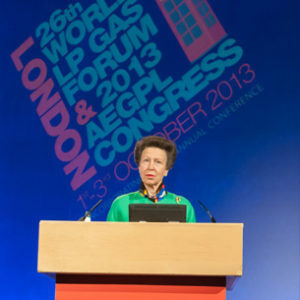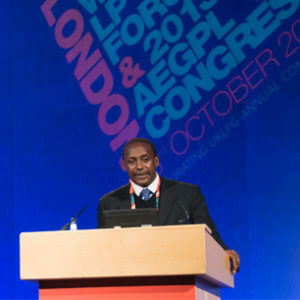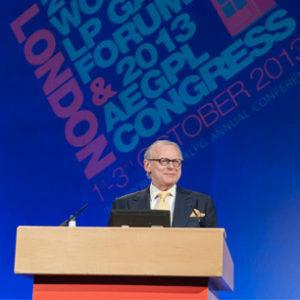The 26th World LP Gas Forum & 2013 AEGPL Congress, October 2013
Final Sessions Report



TUESDAY 1 OCTOBER
Global Technology Conference
Over 300 delegates attended GTC during the opening session of the World Forum. David Tyler welcomed the audience and explained the background to GTC and how the ten papers being presented at GTC London were screened from 22 abstracts submitted from 15 countries. Mr Makota Arahata chaired the first session which contained five papers on some of the latest technologies in LP Gas operations. Robert Battye from Silicon Controls kicked of the conference with a presentation called ‘The road to 65% average fill’ describing how to improve the efficiencies of a bulk distribution system resulting in leaner fleets, safer operations with fewer assets resulting in more satisfied customers. Neil Ormrod from ITO Europe Ltd – a previous winner of the WLPGA Innovation award – presented his paper ‘Eco-friendly LP Gas vapourisers’ describing some new technology on vapourisers using ambient air rather than electricity or gas as the heat source. Dr Janelle Hampton from Donaldson Co Inc, USA presented her paper ‘Complete filtration for on-vehicle liquefied propane gas’ describing new technology to mitigate contaminants in LP Gas including dirt and heavy ends. Mr Marek Gabrys from AIUT, Poland presented his paper called ‘Bulk Customers Delivery Planning Optimisation with Distributed Intelligence Solution - Amerigas Poland Case Study’. He described how the technology could improve the efficiency of a LP Gas distribution system. The final paper of the first session focused on the upstream part of the business. Mr Mukesh Agrawi from PT Surya Esa Perkasa Tbk, Indonesia presented a paper called ‘50% increase in LP Gas production from conventional LP Gas plants by Innovative Technology’. There were several questions for the five presenters from session one before David introduced Tucker Perkins to chair the second session focusing on applications. Tucker introduced Mr Junichi Ogwawa of Rinnai Corporation, Japan who presented a paper called ‘Development of domestic hybrid system of hot water and space heating’ describing the latest Rinnai technology in this area. Mr Ignacio Leiva Pozo of Repsol, Spain presented his paper called ‘High efficiency solution with propane for buildings thermal energy renovation’. Gregg Kerr described some new applications for power generation in his paper called ‘Portable Power Generation’. Examples of portable lighting units were included. Mr Jasper van Sambeek of Prins Autogassystemen BV, Holland presented some new technology on blending LP Gas into diesel with his paper called ‘Success of Dual Fuel Technology Prins Dieselblend – 2.0 System enabling heavy duty vehicles driving on LP Gas’. Mr Moto Otaki from Teito, Japan was unavailable and so Mr Makoto Arahata stood in and presented his paper called ‘Development of the Two-Wheelers Fueled by Autogas’. He described the conversion system called LPG Fuel for 50cc and 125cc vehicles. David closed the session after questions at 12.35pm.
Opportunities for Developed Markets Sharing Success (UK Session)
Two sessions chaired by the UK, overall theme being reducing the demand for fuel use through greater efficiency using LP Gas. Covering the heating challenge, association of energy conservation, Gas Heat Pumps and a vision for growth looking at the off-gas grid, agriculture, automative and industrial usage. Further afield looked at market successes in California, Japan, and the shale gas revolution in the US.
Wednesday 2
October Official opening by HRH The Princess Royal
The event organisers were honoured to welcome Her Royal Highness The Princess Royal who launched this exceptional event with an opening presentation stressing the importance of this unique combined event.
The Rt Hon The Lord Deben Keynote
Lord Deben is Chairman of the UK Government’s Committee on Climate Change and his keynote focused on how energy represents a continuous battle between absolutism and diversity and that 66 states are now dealing with climate change in a serious manner. We can say that the science is now settled. The IPPC report has 9,000 example quotes in the report and has been reviewed and agreed by every country and that diversity of supply will make electricity cheaper. Lord Deben stated he was not opposed to fracking as long as the rules are laid down, but it will be tough to achieve this in the UK. However, we will need gas and LP Gas will have an important role to play. CCS has to become a reality and it is essential for LP Gas industry that we have it. If gas can be used without damaging the environment then it does have a long-term future and we must make sure that the gas industry is a source of less carbon intensive fuel. Lord Deben stated that it will be the innovators at this very conference who will ensure that we get it right.
Dr Kandeh Yumkella Keynote
Dr Kandeh Yumkella the Director General of the United Nations initiative Sustainable Energy for All (SE4ALL) delivered a rousing keynote speech at the Forum Opening. Speaking about the urgent need to address the crises brought on by a lack of access to modern energy by approximately 3 billion people today. This lack of access to modern fuels and reliance on ‘traditional fuels’ such as biomass contributes to high rates of deforestation, desertification, black carbon emissions and the premature deaths of over 4 million people annually. LP Gas, pointed out Dr Yumkella, is one of the best possible solutions available to address this development challenges. Drawing on his experience growing up in a small little rural village in Sierra Leon, he told the audience that the UN Secretary General Ban Ki Moon had decided to launch SE4ALL to address the reality that sustainable development can only occur when and where there is access to clean and modern energy. In a small ceremony following his keynote Dr Yumkella and WLPGA President Kimball Chen signed a letter of intent to cooperate between SE4ALL and WLPGA. The letter acknowledged that both institutions are committed to contribute their efforts to end both the daily degradation of the health and safety of billions of people and to use their respective resources as part of a global multi-stakeholder partnership to produce the systemic changes necessary to support the growth of LP Gas markets and the delivery of clean LP Gas to 1 billion people in developing countries by 2030.
Roundtable: A World of Difference?
The morning roundtable themed 2030 A World of Difference? was chaired by Dr Christoph Frei, World Energy Council. Panelists Mr Vijay Iyer, The World Bank; Mr Jonathan Benchimol, Fogas; Mr Ken Wilson, SHV Energy; Ms Nishi Vasudeva, Hindustan Petroleum and Mr Donal Murphy, DCC Ireland discussed their visions and opportunities for the future in their own markets. Vijay Iyer said the World Bank run 2 programmes and see LP Gas as integral. Barriers are not the same globally and strategies need to be customised. Mr Wilson stated the need to invest in lower carbon technology and nuclear renewables and also to develop new technology in wind and solar. BUT nuclear is now on hold and bio has deforestation issues and incentives are being removed which gives an opportunity for LP Gas and LP Gas needs to become the energy of choice. The industry cannot wait for LP Gas to evolve slowly and the industry must lead change and encourage customers to embrace new technologies. Mr Benchimol stated that the model in Latin America is very diverse. He sees a positive future on demand and will improve welfare of the population. The government will eventually see the damage done by wood etc and needs to be strict with dealing with issues such as illegal filling. There is great potential also in agriculture. Ms Vasudeva discussed the subsidy situation in India and the massive logistical challenges in this country. Four million cylinders are delivered every day 87% of these to very remote areas. India has developed a programme called Vision 2015 to spread LP Gas to very remote regions and switch to LP Gas from other fuels such as wood. The main challenge is the huge and growing population and the severe poverty in some areas. Mr Murphy discussed how LP Gas is a key pillar in offgrid use in Ireland. Some investment is done in renewables but this is not such a primary pillar and seen more important as a bundled fuel. No supply issues in the medium term which mean it should become more competitive price wise. Mr Murphy asked how can industries stimulate demand with new technologies and bundling and how can we position LP Gas so it is not seen as a niche product but as a clean transition fuel. More investment is needed in infrastructure and to protect assets.
Autogas Roundtable-Exceptional Energy on the Move
The first of two breakout sessions on Autogas was chaired by Eric Johnson, Managing Director of Atlantic Consulting who’s round table took on heavily strategic subjects as emissions measurement and availability of fuel on a global scale. Mature markets face substantial changes that are perceived as opportunities by the more dynamic participants forging the niche for Autogas in the future fuels mix. All participants agreed that the customer experience and the feasibility of driving on Autogas are and will remain main drivers for the sector. It is up to the industry to keep up with the fast paced development of the automotive industry to provide the answers for tomorrow’s challenges today. The forecasted increased availability of LP Gas incentivises development to secure a reasonable market share. The second session, chaired by Warring Neilsen and focused in on the technical solutions in the development pipeline, provide some of the answers to the questions posed in the first session. Especially the customer experience of refuelling an Autogas vehicle can be drastically improved by small technical adjustments. Global standardisation of refuelling connectors and the fuel itself will provide the widening of the technical basis on which the global fleet can grow in larger numbers. Innovations presented, such as lower cost conversions or dedicated developments unlocking the full potential of this versatile fuel will secure Autogas’ place in the 21st century. All in all it was refreshing to see that the industry has the ability to revise the status quo on a critical basis and give itself the impulse to develop further. Especially accommodating for the needs of the automotive manufacturers will both secure a wide gamut of Autogas models available as well as retrofit kits that will harmonise well with future engine concepts.
LP Gas Upstream– Pricing and Production
Delegates who attended the Upstream session on Wednesday afternoon were treated to some excellent presentations on the key game changing events affecting the LP Gas industry including US Shale gas, the Panama Canal extension and the HNS Convention. This was followed by a stimulating round table discussion on the widening gap between production and consumption and the impact this will have on the future of pricing of LP Gas, especially the role of CP and whether this would change.
Thursday 3 October
Downstream: Demand and Desire
Mr Paul Ladner, UGI International, chaired the first morning session that looked at the main characteristics of demand and supply of the downstream sector. Mr Walt Hart, HIS, focused on the global LP Gas demand in a dynamic supply market. He pointed out that LP Gas production is increasing everywhere, mainly in Middle East, Asia and in US, which became net exporter from 2008-2009 thanks to the impact of shale gas and oil. Asia will continue to be the world largest LP Gas demand region and over the next 10 years it will drive the global LP Gas demand. The LP Gas market continues to be dominated by commercial and residential demand, often driven by government subsidies. Mr Adebayo Ibirogba, from the NNPC (Nigerian National Petroleum Company), presented the Cooking For Life programme, a WLPGA campaign that aims at bringing LP Gas, as clean and safe fuel, to people in developing countries who don’t have access to modern fuels. Considering that 2.8 billions of people on the planet rely exclusively on solid fuels, the Cooking For Life programme can represents a good solution and would be a great message for the LP Gas community. Mr Leandro Del Corona, Ultragaz, spoke about the opportunities of the Brazilian downstream LP Gas market. Although Brazil is still a net LP Gas importer, it is one of the biggest markets in the world (7mton/year) and around 90% of households use LP gas. He pointed out the importance of investing in infrastructure for natural gas distribution, which will push LP gas production and distribution. Logistics and distribution remains the main challenge today in Brazil. Mr George Paul, Bharat Petroleum, highlighted the main characteristics of India’s economy. India’s 60 % of population live in rural areas and the country is the 7th LP Gas producer in the world. Government subsidies are available to Indian LP Gas consumers. He presented the features of exclusive rural distribution model RGGLV, an innovative distribution model with less distribution costs. Mr Roy Willis, PERC, focused on the importance of technology and investment in R&D in order to help the retail market. Their commercialisation strategy aims at educate consumers about the benefits of propane.
Opportunities in the Developing Markets: Eye on Africa
Ms Radha Muthiah, Global Alliance for Clean Cookstoves, Chaired the session and noted that LP Gas was an excellent tool to help the African continent develop. She underscored that her organisation worked closely with the World LP Gas Association in its mission to save lives, improve livelihoods, empower women, and protect the environment by increasing access to clean cooking solutions. Mr Blaise Edja, Oryx, focused on LP Gas demand in Sub-Saharan Africa and how this represented an excellent growth opportunity for the future. He noted that the region was ready for big investments in LP Gas infrastructure and that companies like Oryx needed the support of organisations like WLPGA to make sure the right national policies are in place to encourage that investment. Mr Hamoumi Tawfiq, Afriquia Gaz, gave an overview of the situation in the Moroccan market and the challenges it faces as it tries to reform the subsidy regime so that it costs the state less and benefits the segments of the population who need it most. Mr Kevin Robertson, LP Gas Safety Association of South Africa, discussed the new infrastructure projects in South Africa that are set to provide a platform for market growth. He also noted that these developments could have ramifications beyond the borders of South Africa throughout the Southern African region. Mr Nasr Elhussein, Nile Petroleum, focused on the opportunities that exist in East Africa and used the success of Nile Petroleum in Sudan as an example of how growth could occur throughout the region. He pointed out that East Africa is a large region geographically with high reliance on biomass and kerosene and facing accelerated deforestation. Mr Renzo Bee, Global Cylinder Network, discussed the importance of the cylinder market model to stimulate growth in the African context. He noted that WLPGA had recently completed a set of Guidelines for early stage markets through its Global Cylinder Network that outlined the best distribution model for countries to encourage investment in cylinders and grow their industries in a safe and disciplined way.
Making a World of Difference!
The final session of the Forum united a fascinating group of panellists who each demonstrated how LP Gas is used – and indeed can be a life-saver – in often extreme circumstances and on an array of scales. Chaired by Mr Jamal Gore from Carbon Clear Ltd, who gave an overview of the LP Gas conversation programme supported by his company in Sudan bringing low smoke cookstoves to families in Darfur. Mr Abhay Nath Jha, Indian Oil Corporation, showed how maintaining uninterrupted LP Gas distribution during the recent flood disaster in U’Khand ensured continued fuel for thousands of victims thus saving lives in very tragic circumstances. At the other end of the scale British explorer Mr Nick Hancock demonstrated why LP Gas is his fuel of choice for remote solo expeditions. Turning to the UK, Mr Rob Shuttleworth, UKLPG explained how a new report is targeting carbon reduction in off-grid Britain and how LP Gas is factoring in this process. Ms Christina Espinosa, Gentegas showed how her company has a mission to bring LP Gas to families in Guatemala via a unique business model giving access to clean burning stoves and fuels to families in Guatemala. On a much larger scale, Mr Taryono, Pertamina gave an overview of the kerosene to LP Gas conversion programme undertaken in Indonesia covering some 316 cities and converting literally millions of people. Finally, a look at LP Gas in the marine world and Captain Bernardo Herzer of Lehr Inc showed how the many benefits of LP Gas make it the choice for marine companies, specifically when helping reducing sulphur levels and that with over 12 million registered vessels in the US alone this represents a significant opportunity for the industry.